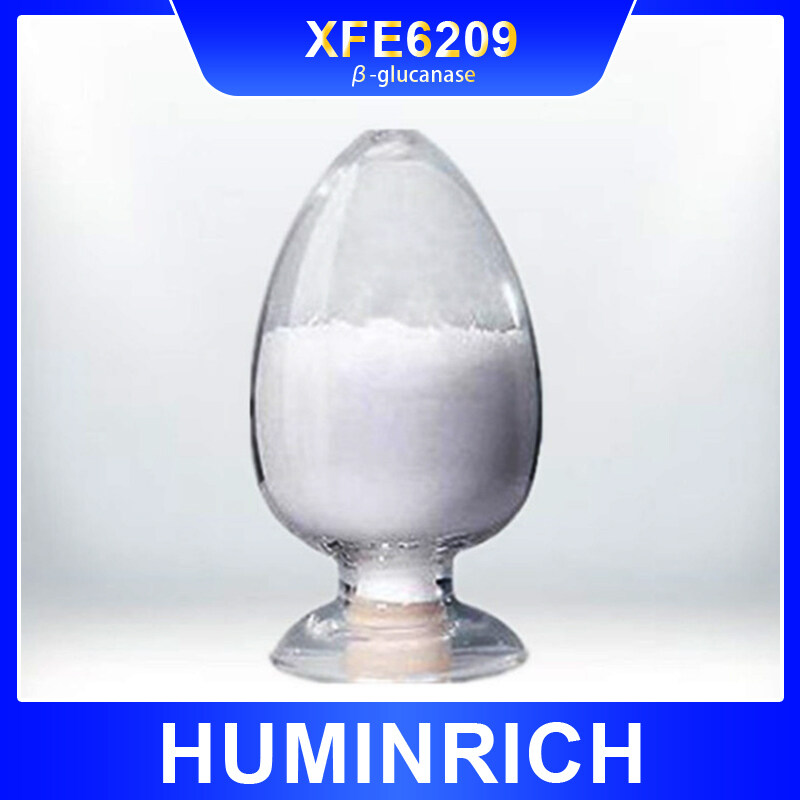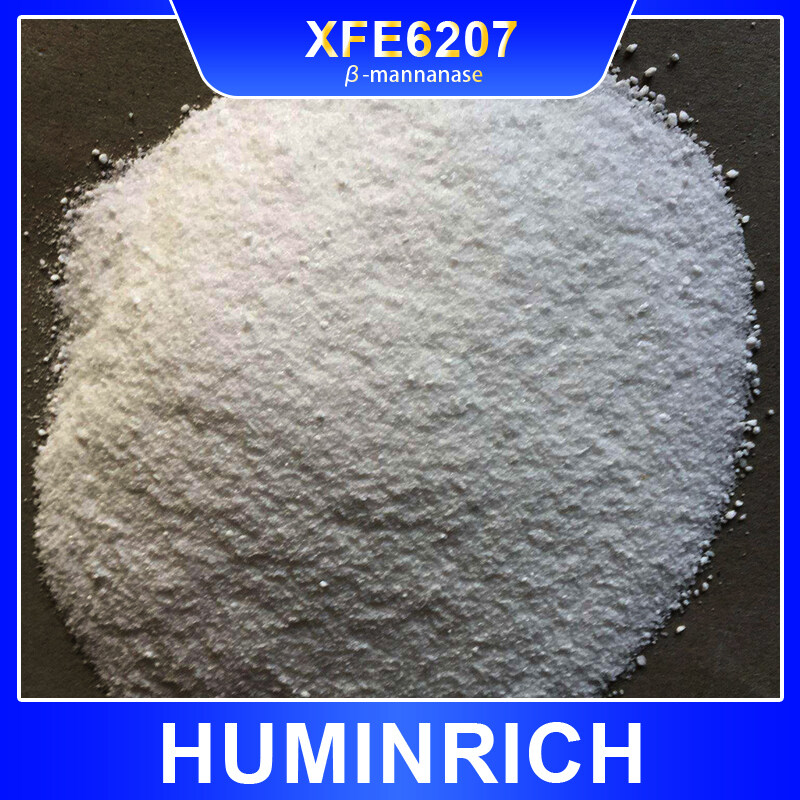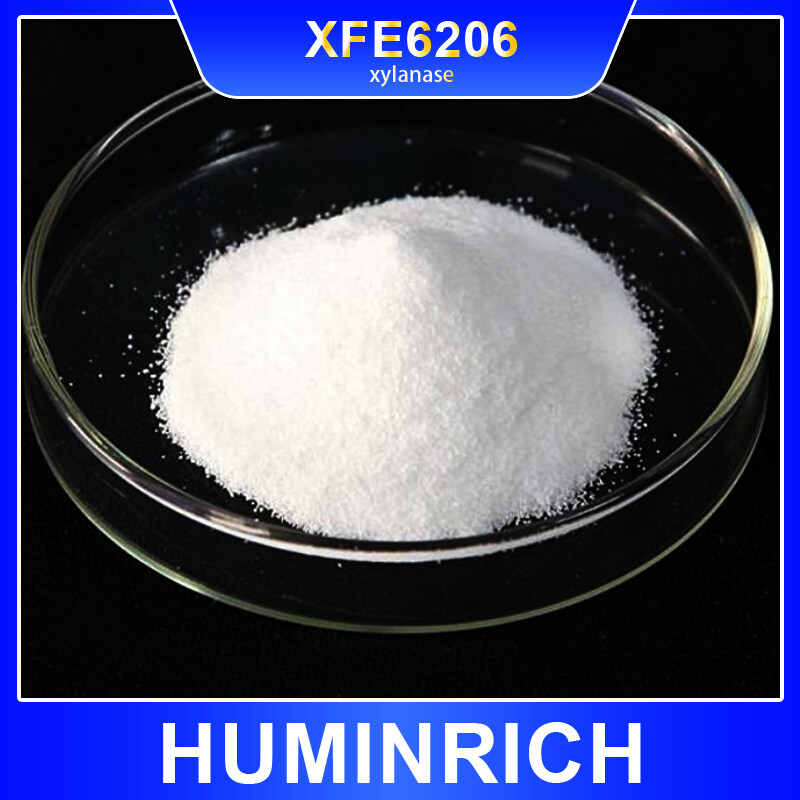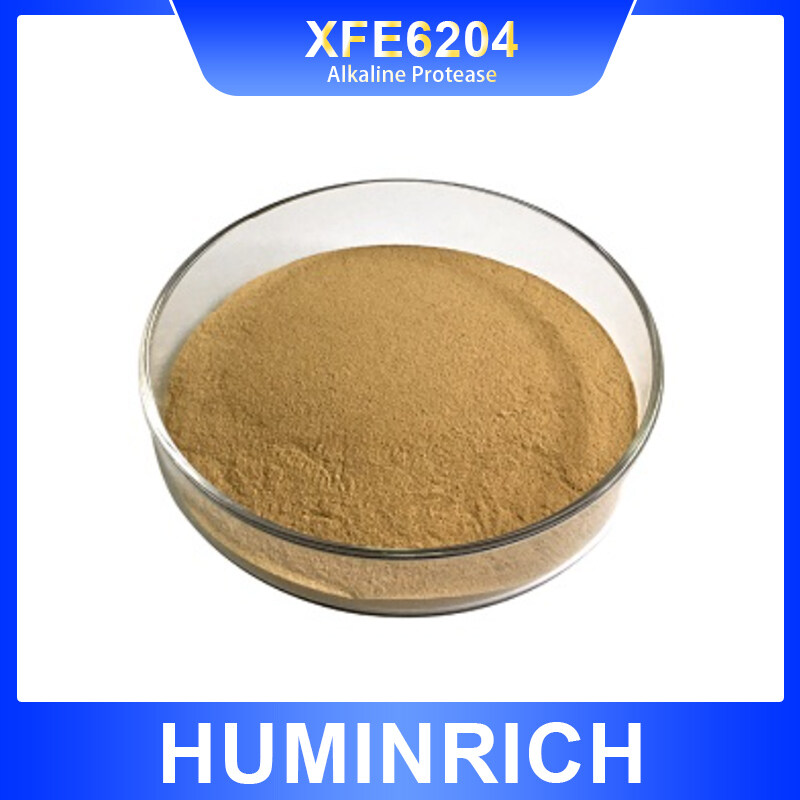Email format error
Email cannot be empty
Email already exists
6-20 characters(letters plus numbers only)
The password is inconsistent
Email format error
Email cannot be empty
Email does not exist
6-20 characters(letters plus numbers only)
The password is inconsistent

Feed Grade β-glucanase Cas 9025-70-1
β-Glucanase is an enzyme preparation that can efficiently break down β-glucan in the endosperm cell walls of wheat and cereal plants. In the field of feed, it can significantly increase the nutritional value of feed and reduce the content of anti-nutritional factors, thereby improving the absorption of nutrients by livestock and poultry, increasing the growth rate and feed conversion efficiency of livestock and poultry.
Catalog of Enzyme Preparations
20240409
|
Type |
Model No. |
Chemical Name |
Activity (u/g) |
CAS No. |
|
Industry Grade |
XFE6001-1 |
Alkaline Protease |
200000 |
9014-01-1 |
|
Industry Grade |
XFE6002-1 |
Neutral protease |
50000 |
|
|
Industry Grade |
XFE6002-2 |
Neutral protease |
10000 |
|
|
Industry Grade |
XFE6003-1 |
Acid protease |
50000 |
9025-49-4 |
|
Industry Grade |
XFE6004-1 |
Lipase |
100000 |
9001-62-1 |
|
Industry Grade |
XFE6004-2 |
Lipase |
8000 |
9001-62-1 |
|
Industry Grade |
XFE6005-1 |
Mesophilic amylase |
4000 |
9000-90-2 |
|
Industry Grade |
XFE6005-2 |
Mesophilic amylase |
15000 |
9000-90-2 |
|
Industry Grade |
XFE6006-1 |
High Temperature Amylase |
40000 |
9001-19-8 |
|
Industry Grade |
XFE6007-1 |
Acid cellulase |
10000 |
9012-54-8 |
|
Type |
Model No. |
Chemical Name |
Activity (u/g) |
CAS No. |
|
Food Grade |
XFE6101-1 |
Natural protease |
100000 |
|
|
Food Grade |
XFE6101-2 |
Natural protease |
150000 |
|
|
Food Grade |
XFE6101-3 |
Natural protease |
200000 |
|
|
Type |
Model No. |
Chemical Name |
Activity (u/g) |
CAS No. |
|
Feed Grade |
XFE6202-1 |
Acid protease |
150000 |
9025-49-4 |
|
Feed Grade |
XFE6203-1 |
Natural protease |
50000 |
|
|
Feed Grade |
XFE6204-1 |
Alkaline protease |
200000 |
9014-01-1 |
|
Feed Grade |
XFE6205-1 |
α-amylase |
5000 |
9000-90-2 |
|
Feed Grade |
XFE6206-1 |
xylanase |
100000 |
9025-57-4 |
|
Feed Grade |
XFE6207-1 |
β-mannanase |
50000 |
37288-54-3 |
|
Feed Grade |
XFE6208-1 |
cellulase |
10000 |
9012-54-8 |
|
Feed Grade |
XFE6209-1 |
β-glucanase |
50000 |
9025-70-1 |
Feed Grade β-glucanase
【Product specifications】10,000 ~ 400,000 u/g, different energy products can be produced according to customer needs.
【Conditions of Use】
Applicable temperature range is 30-60 ℃, optimal temperature range is 50-55 ℃;
Applicable pH range is 4.8-7.5, optimal pH range is 6.0-6.5.
【CAS No.】 9025-70-1
1.Product specifications:
|
Grade |
Feed Grade |
|
Appearance |
white powder |
|
Size |
60-80 mesh |
|
Activity |
50000 |
|
Loss on dry |
≤ 10% |
|
Salmonella |
Negative |
|
Escherichia coli (per 100g) |
≤ 3000 |
|
Aflatoxin B1 (μg/kg) |
≤ 10 |
|
As |
<3ppm |
|
Pb |
<10ppm |
|
Cd |
<1ppm |
2. Product features:
High activity and stability: β-glucanase has excellent heat resistance and acid resistance, and can maintain high enzyme activity in feed processing and animal digestive tracts.
Strong substrate specificity: This enzyme has obvious degradation effect on β-glucan in feed materials such as corn, wheat and barley.
Improve feed utilization: It works synergistically with xylanase and cellulase to destroy plant cell wall structure, release nutrients, and improve feed utilization.
Improve animal production performance: degrade β-glucan, reduce intestinal chyme viscosity, reduce diarrhea and other phenomena, and improve animal production performance.
Improve endogenous enzyme activity: Significantly increase the activity of trypsin, amylase and lipase in the intestinal contents of animals.
3. Production process:
The production of β-glucanase mainly uses microbial fermentation. Among them, the Bacillus Licheniformis strain is a commonly used production strain. The β-glucanase produced by its fermentation is an endonuclease that can act on the 1,3 and 1,4 glycosidic bonds of β-glucan to generate 3-glucanase. Oligosaccharides and glucose with 5 glucose units. In the production process, the strain first needs to be inoculated into the seed medium for culture. After the strain grows to a certain stage, it is transferred to the fermentation medium for fermentation. After the fermentation is completed, the bacterial cells are collected through centrifugation, precipitation and other steps, and then β-glucanase can be obtained after washing, drying and other treatments.
4. Process characteristics:
Strict control of fermentation conditions: During the microbial fermentation process, conditions such as temperature, pH value, and oxygen supply need to be controlled to ensure the growth of strains and the synthesis of enzymes.
Advanced separation and purification technology: centrifugation, precipitation and other steps can be used to effectively separate and purify enzyme preparations and improve the purity and activity of the product.
5. Product application:
Adding β-glucanase to feed can effectively reduce the content of non-starch polysaccharides (NSP) and its anti-nutritional factors, improve the absorption of nutrients by livestock and poultry, and increase the growth rate and feed conversion efficiency of livestock and poultry. At the same time, the enzyme can also reduce the viscosity of intestinal digesta, reduce diarrhea and other phenomena, and improve the production performance of animals.
Beta-glucanase is an enzyme preparation that is widely used in the feed field. It is mainly used to degrade β-glucan and help improve the digestibility and nutrient utilization of β-glucan in animals. The following are the main applications and advantages of beta-glucanase in the feed field:
Promote digestion and nutrient absorption: β-glucanase can effectively degrade β-glucan in feed and convert it into easily digestible simple sugars, thereby improving the animal’s digestibility of β-glucan and enhancing nutrition. absorptive capacity.
Increase the energy value of feed: By promoting the degradation of β-glucan, β-glucanase helps to increase the energy value of feed and improve the efficiency of animals’ use of energy in feed.
Improve the taste and digestive performance of feed: β-glucanase can improve the taste and digestive performance of feed, make the feed easier to digest, and improve the appetite and digestive function of animals.
Reduce feed costs: By improving the nutritional value and utilization of feed, β-glucanase helps reduce feed costs and improve breeding efficiency.
Promote animal growth and development: By improving the nutritional value and digestive performance of feed, beta-glucanase helps promote animal growth and development and improve production efficiency.
Suitable for a variety of animal species: β-glucanase is suitable for use in feeds for a variety of animal species, including poultry, livestock and aquaculture, etc., to improve their ability to digest and utilize β-glucan.
In the field of feed, the application of β-glucanase provides important technical support for feed production, can improve feed quality, increase animal growth efficiency and utilization, and promote the development of the livestock and poultry breeding industry.
6. Recommended dosage:
Adding amount of this product per ton of compound feed: 10-50g/T.
7. Precautions
Enzyme preparations should be sealed away from light and stored in a cool, dry, ventilated place to avoid moisture and high temperatures.
During use, contact with heavy metal ions (Fe³⁺, Cu²⁺, Hg²⁺, Pb²⁺, etc.) and oxidants should be avoided to avoid inhibiting or destroying enzyme activity.
There may be differences in color between different batches of products, but this will not affect its effectiveness.
The addition amount should be adjusted according to the specific feed formula and livestock and poultry species to achieve the best effect.
8. Product storage:
Moisture-proof, light-proof, sealed, stored at low temperature (0-10℃), shelf life is 24 months. There is a certain loss of enzyme activity during storage. The enzyme activity loss is 5-10%/6 months when stored at 10°C, and the enzyme activity loss is 10-15%/6 months when stored at room temperature.
9. Packaging, transaction method, delivery method, etc.:
Packaging: 1kg/25kg bag/drum with linner inside.
Payment method: Western Union; T/T; MoneyGram
Shipping method: Sea/Air/Domestic Shipping}
10. After-sales service/customized service/sample service:
Packaging customization: Customized services are provided for packages above 1000KG;
Sample service: samples are available;





